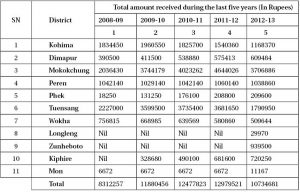‘Some VDBs functioning under direction of influential persons’
Eastern Mirror Desk
Dimapur, July 21: Village development schemes aim to uplift the socio-economic condition of the rural people. The main stakeholders of the schemes are the targeted beneficiaries.
According to an “evaluation study on functioning and impact of Village Development Board (VDB) in Nagaland,” conducted by the directorate of evaluation, govt. of Nagaland, 3680 beneficiaries of rural development schemes were selected.
The total number of selected beneficiaries for the study was 330 from Kohima district; 300 from Dimapur; 450 from Mokokchung; 200 from Peren; 400 from Phek; 450 from Tuensang; 350 from Wokha; 150 from Longleng; 400 from Zunheboto; 250 from Kiphire and 400 from Mon district. The field work for the study, it mentioned, was started in November 2014.
According to the report by the directorate of Evaluation in Phek district the study team could not cover 10 beneficiaries of a village due to them not being available on the day of the survey. The total number of beneficiaries who were interviewed in the district was 390.
‘In Tuensang district, 35 beneficiaries could not be contacted due to the Chang and Yimchungru ethnic clashes and in Mon district 32 beneficiaries could not be interviewed due to non cooperation by the selected beneficiaries.’
Out of the 3603 beneficiaries who were interviewed, 710 (20%) were illiterate while beneficiaries whose qualification was class-10 or below were 2725 (75%). Also, the qualification of 158 beneficiaries (4%) were class-11 and above. The remaining 10 beneficiaries were theologians; out of 3603 beneficiaries, 56 beneficiaries were govt. employees, 3041 beneficiaries were cultivators and 506 beneficiaries were engaged in business or were church workers.
The report stated that beneficiaries in Kohima, Dimapur, Mokokchung, Peren, Phek and Kiphire district were aware of the VDB development plans. But in Tuensang, Wokha, Mon, Longleng and Zunheboto district there were beneficiaries who were not aware of the VDB ‘plans.’
Big on building, little on income growth
It was also mentioned that respondents from the 11 districts indicated that the VDBs give more emphasis to infrastructure development and less to income generating schemes.
Reports about insufficient funds for schemes in Dimapur, Peren, Phek, Tuensang, Wokha, Kiphire and Mon districts indicated insufficiency in implementing projects while Mokokchung district expressed satisfaction at the ‘adequacy’ of the funds that were provided.
“Inspection and monitoring of implementation of schemes and projects are crucial to ensure outcomes as envisaged. Therefore, one of the questions canvassed was on inspection and verification by officials 81% of the selected beneficiaries indicated inspection of schemes by departmental officials and 19% of the beneficiaries informed that they were not aware of official inspection by the department.”
According to the study, the respondents reported that the average official inspection in Kohima, and Mokokchung district was three times while in Dimapur, Peren, Tuensang, Wokha, Longleng, Zunheboto and Kiphire districts, it was twice; and in Phek and Mon district only once.
Job cards
Out of the 3603 beneficiaries, 3084 beneficiaries were job card holders. However, 619 beneficiaries did not posses job cards. In Mon district, out of 368 selected beneficiaries only seven were job card holders.
Records
During the survey it was found that out of 3603 beneficiaries who were covered, 996 beneficiaries did not maintain records whereas 2607 beneficiaries maintained proper records of the amount of funds sanctioned by the VDB for their projects.
Transparency, interference, and genders
The study compiled comments from beneficiaries. They were mentioned:
“Some VDBs were functioning under the direction of influential persons and not as per the decision of the VCC. Such interferences should be checked.”
“Many VDBs do not reveal the amount received or utilised. They do not disseminate information to the stakeholders. Transparency should be maintained in the utilisation of funds.”
“Most of the VDB members were illiterate and incapable of managing the VDB. Therefore, only capable persons should be selected.”
“Since women are more sensitive to the needs of the people, more funds of the VDB should be allotted to women to enable them to take up pragmatic projects.”
“Deduction from the amount sanctioned for village projects should be stopped. Educating the beneficiaries/villages on their entitlement will reduce such unwarranted practises,” it stated.


